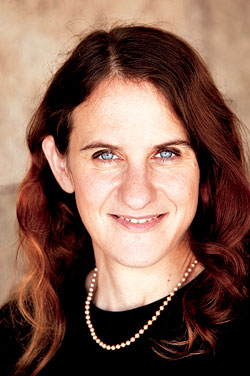They dress like dorks, they’ve never read Foucault, and, most offensive of all, they’re preoccupied with making money. These are some of the reasons in Bonjour Laziness: Jumping Off the Corporate Ladder (Pantheon, $15.95) that Corinne Maier despises the MBA types she works with. I, too, am a liberal-arts person who makes a living in the corporate world, so I understand it’s not an environment that honors your precious little individuality. But I learned to get over myself. Business, for all its insipid buzzwords and groupthink, has no more silliness and inefficiency than any other human activity. And I say thank God for those business dorks and thank God for the great capitalist engine of prosperity that funds the droll little observations of liberal-arts types everywhere.
Maybe Maier, an employee of the French electricity giant EDF, is right in Bonjour that cube dwellers should disengage because “business is not humanistic.” Maybe I have been on the company Kool-Aid for so long that I no longer feel the fluorescent lights sucking my soul out the top of my head. Maybe. But her book, a best seller in Europe, is still a rambling, whiney mess. Imagine 21 Dog Years written by a pompous bore. I’d like to think that, with its glib, half-formed ideas and modest length (136 pages with lots of white space), it’s a kind of parody of those business books for people who don’t like to read, a Who Moved My Cheese? for the alienated. Sadly, I think it’s more likely that Maier really is lazy. Her book demonstrates how ugly things can get when you do something you don’t care about.
In his How to Be Idle (HarperCollins, $16.95), Devon native and Idler magazine founder Tom Hodgkinson, by contrast, understands the crucial difference between laziness and idleness. “Paradoxically,” he writes in his charming guide to leisure as a fine art, “in order to be truly idle, you have to be efficient.” For example, if you want your living room, like the author’s, to be a home pub, it takes at least a little bit of focus.
Hodgkinson, writing in breezy, irresistibly British prose, divides both his book and the hours of the day into appropriate activities: 3 p.m., the nap; 4 p.m., tea time; 6 p.m., the first drink of the day, etc. He delivers discourses on these subjects with the nonchalance of a man reclining on his beloved daybed (“a delicious concept,” he exclaims, “even naughty: a bed for the day!”), interspersing his own observations with quotes from Chinese poets and books like Cigarettes Are Sublime and The Book of Tiki: The Cult of Polynesian Pop in Fifties America.
I only wish Hodgkinson, who is a dad, had written a bit more about kids and idleness. Because, with a child myself, I would like some tips on how to fit in all that moon gazing and pipe smoking. But also because kids are such perfect role models for any aspiring slacker. The mind-set of the toddler out for a stroll, stopping to enjoy every pebble and patch of moss, seems to be what Hodgkinson is advocating as an antidote to bourgeois striving. It’s certainly a more attractive alternative than the adolescent sulking practiced by Maier.








